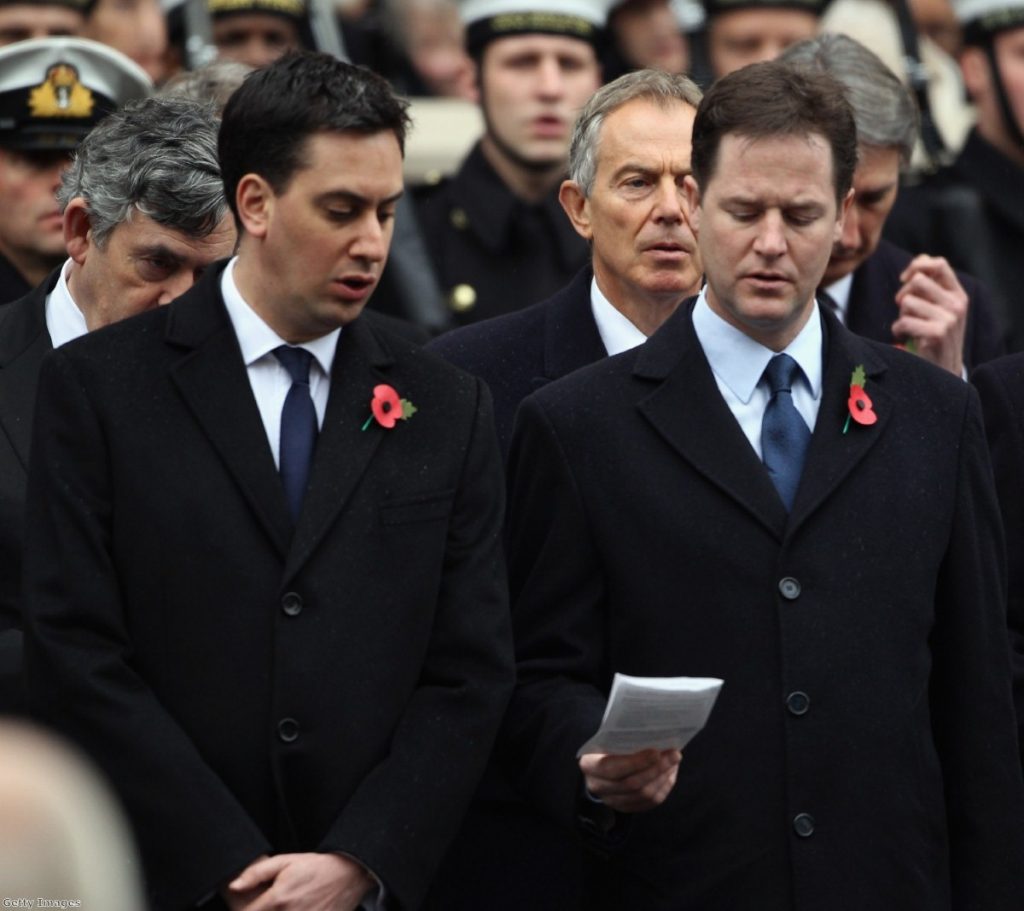The Leveson Lib-Lab pact: Is this the start of a 2015 coalition?
Labour and the Liberal Democrats put forward their proposals for press regulation today, in a sign of warming relations between the two parties which could herald a Lib-Lab coalition in 2015.
Ed Miliband and Nick Clegg were outraged yesterday when David Cameron quit talks on implementing the Leveson proposals and triggered a vote on a royal charter for the press in a dramatic press conference in Downing Street.
Today, the two party leaders manoeuvred against the prime minister, as their cooperation in private talks started to be conducted in public.
The move suggests a degree of friendliness between Miliband and Clegg which had not previously been evident. Miliband has usually been extremely hostile to the Lib Dem leader, to the extent that it was difficult to imagine them working together in the event of another hung parliament in 2015.
But with Clegg's position consolidated by the by-election victory in Eastleigh and Vince Cable ruling himself out of a leadership challenge, the Labour leader is increasingly having to face up to the prospect of forming a government with his Lib Dem counterpart after the general election.
Tory rebellion
Some Tory backbenchers are considering backing the pair's proposals for statutory regulation of the press, including Robert Buckland and George Eustice, who was irritated by the prime minister's decision to pull out of talks.
"I am waiting to see precisely what’s going to be the government's royal charter proposal," Buckland told the Today programme.
"If what’s proposed doesn't fully deliver what Leveson came up with – let's remember what Leveson said wasn't bonkers – then colleagues and me, people in my position, are going to have to think very carefully how we are going to cast our votes."
Buckland wants to ensure there is no press veto on membership of the regulatory committee and that the body has the power to dictate the wording and position of apologies. Both those issues are supported by Labour and the Lib Dems.
Media secretary Maria Miller took to the airwaves today to defend the Cameron proposal, saying it was a workable solution to long-running concerns about press behaviour which did not threaten freedom of speech.
"I think after three months of cross-party talks, now is the time to bring this to a head, because we want to see action," she said.
"We know that we've got a solution that is workable, we want to see that go forward so we can actually get in place the self-regulation that Leveson called for."
Politics.co.uk's analysis of Monday's crucial vote suggests the Lib-Lab axis has the slight upper hand once the votes of smaller parties are taken into account, but any majority could be in single figures.
If enough Tory backbenchers rebel it could be a defining moment in Cameron's leadership and will be treated by opponents as a loss of confidence in his leadership.
But even if he manages to get his amendments to the crime and courts bill through, they could well be defeated by the Lords, where peers typically take a harsher stance on press behaviour than their counterparts in the Commons.
Leadership speculation
Already there are criticisms of Cameron's decision to pull out of talks, with some commentators suggesting he is pushing his coalition allies into Labour's arms – a particularly dangerous notion when opinion polls show the Tories are unlikely to be able to secure a majority on their own.
Worries over Cameron's shock strategy – which saw him cancel talks with Clegg and Miliband at 10:00 GMT yesterday morning before holding an unannounced press conference – come amid continued signs of mutiny from members of his Cabinet.
London mayor Boris Johnson hit back at potential challengers to the prime minister today, in an attack which was interpreted as a not-so-subtle dig at home secretary Theresa May.
"If ministers are setting out their stall now, it strikes me as being very odd," he told the Sun.
"They should save their breath and cool their porridge. Put a sock in it and get on and back the prime minister.
"David Cameron is doing a fantastic job. I am backing him. It's mid-term. People need some sort of political drama so they're inventing one. I think it's complete nonsense."
Press reaction
While it may have caused trouble in his own ranks, Cameron's move will earn him the affection of most of the right-wing press. The Daily Mail was particularly damning in its attack on Miliband this morning, branding his cooperation with Clegg a "tawdry alliance".
In a reference to Hugh Grant, it also attacked "the pathetic spectacle of Her Majesty's opposition cravenly trying to appease a faded film star with a rackety sex life".
The Sun also vociferously supported the prime minister, with a headline which read: "Cam showdown to save our free press".
Even the Mirror, which is usually highly critical of Cameron, portrayed him as a champion of free speech.
But the press is not united in its view of statutory legislation. The Guardian, Mirror, Independent and Financial Times have refused to put their names to a Newspaper Society statement on the issue.





-01.png)